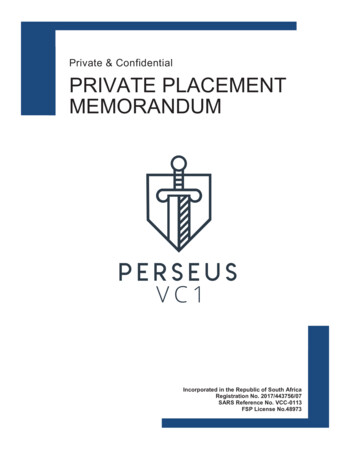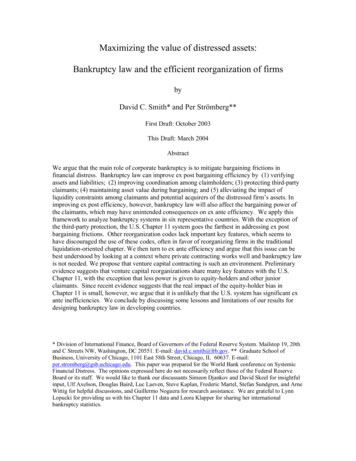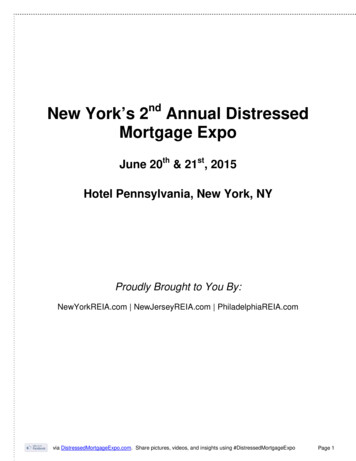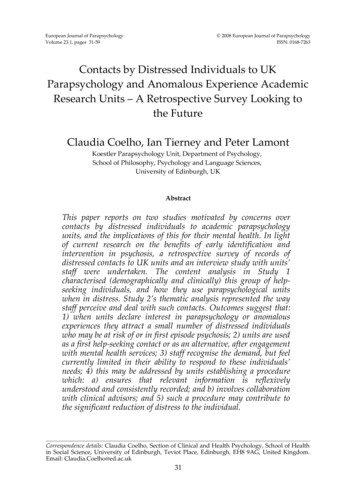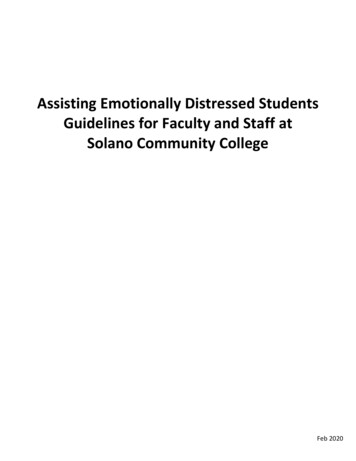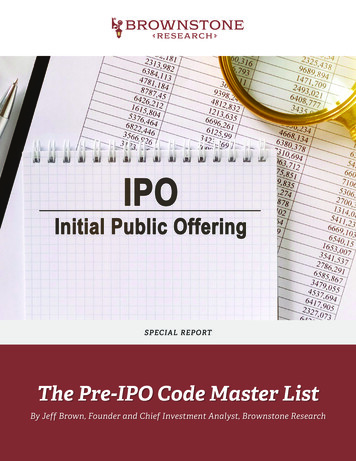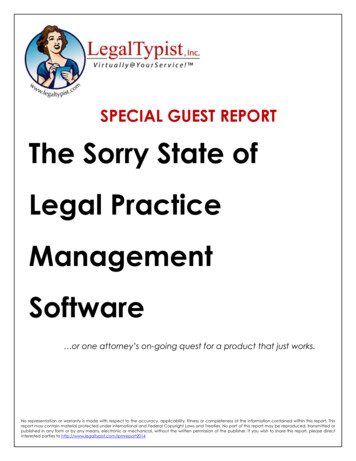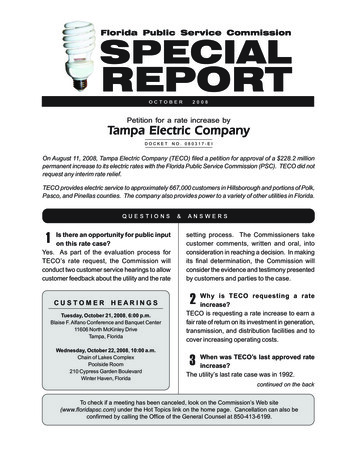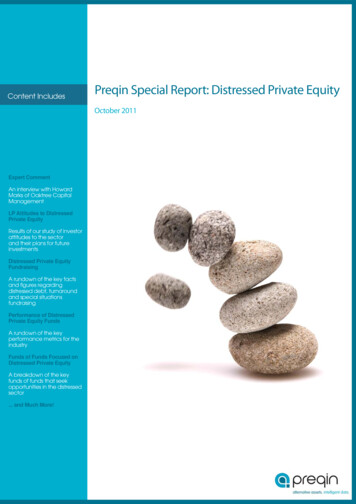
Transcription
Content IncludesPreqin Special Report: Distressed Private EquityOctober 2011Expert CommentAn interview with HowardMarks of Oaktree CapitalManagementLP Attitudes to DistressedPrivate EquityResults of our study of investorattitudes to the sectorand their plans for futureinvestmentsDistressed Private EquityFundraisingA rundown of the key factsand figures regardingdistressed debt, turnaroundand special situationsfundraisingPerformance of DistressedPrivate Equity FundsA rundown of the keyperformance metrics for theindustryFunds of Funds Focused onDistressed Private EquityA breakdown of the keyfunds of funds that seekopportunities in the distressedsector. and Much More!
ContentsForeword.p. 3Expert Comment: .p. 4Howard Marks, Oaktree Capital ManagementLP Attitudes to Distressed Private Equity.p. 5The Role of Distressed Private Equity.p. 7Distressed Private Equity Fundraising 2004 - August 2011.p. 8Editor:Richard StusReview of Fundraising MarketRegional FundraisingFundraising by Fund TypeProduction Editor:Alex JonesCurrent Distressed Private Equity Fundraising Market .p. 13Sub-Editor:Distressed Private Equity Fund Managers.p. 15Distressed Private Equity Funds of Funds. p. 17Distressed Private Equity Fund Performance.p. 18About Preqin.p. 20Helen KenyonSam MeakinContributors:Gary BroughtonAdam CounihanBogusia GlowaczAntonia LeeLouise MaddyKamarl SimpsonCindy SmithAnna StrumilloClaire WilsonPreqin:New York: 1 212 350 0100London: 44 (0)20 7645 8888Singapore: 65 6407 1011Email: info@preqin.comWeb: www.preqin.com
Preqin Special Report: Distressed Private EquityForewordDistressed private equity has become an increasingly prominent part of the overall private equity industry. Funds targeting the sectoraccounted for 10% of all private equity fundraising in both 2010 and January-August 2011, up from just 3% in 2006, illustrating theincreasing appetite shown by institutional investors for these vehicles.Preqin groups three types of private equity fund under the umbrella term, ‘distressed private equity’: distressed debt, turnaround andspecial situations.Distressed debt involves purchasing debt securities that are trading at a distressed level, in anticipation that those securities willhave a higher market valuation and generate profit at a future selling point, or taking a position to potentially gain control of an asset.Turnaround investments focus on purchasing equity in companies that are in distress, and aiming to subsequently restore thecompany to profitability.Special situations investments focus on event-driven or complex situations, where a fund manager may be able to exploit pricinginefficiencies due to an expected or actual significant event.The protracted recovery of the Western economies from the global downturn, as well as other factors such as the European sovereigndebt crisis, means that distressed private equity funds will continue to have a significant role to play in the private equity industry inthe coming years.Preqin calculates 151 distressed private equity firms have an aggregate 55bn in dry powder at their disposal, and competition fordeals is expected to intensify given the record number of vehicles currently on the fundraising trail: for the fourth consecutive year,the number of distressed private equity funds on the road has increased. As of September 2011, the figure stood at a record 62 fundsseeking an aggregate 62.6bn.Institutional investors still recognize the value of including exposure to distressed private equity in their investment portfolios. In thecompilation of this report, we conducted in-depth interviews with over 50 prominent LPs from around the world which have expressedan interest in distressed private equity funds to find out about their plans for investment in the sector. The results of this study can befound on page 5.In addition to the results of our investor study, we are pleased to include an exclusive interview with Howard Marks from leading firmOaktree Capital Management which provides further perspectives on the key trends affecting the industry.We hope you find the Preqin Special Report: Distressed Private Equity a useful and interesting guide. With teams in New York,London and Singapore, our real-time global private equity coverage is the most pertinent and comprehensive available. If you wouldlike more information or have any feedback, please feel free to contact us at any of our offices.Richard StusManager - GP Data 2011 Preqin Ltd. / www.preqin.com3
Preqin Special Report: Distressed Private EquityExpert Comment:Howard Marks,Oaktree Capital ManagementWe spoke to Howard Marks, Chairman of Oaktree Capital Management, about the currentopportunities in the distressed debt market. Founded in 1995, the firm is involved in lesseffificient markets and alternative investments and currently has around 600 employeesbased in offices across the globe.Our latest LP survey shows that appetite for distressed debt is second behind that for mid-marketbuyouts. Are you finding it easy to attract investment at the moment?We’re certainly reaching our goals on our funds, but then we’re raising smaller funds now. We raised a very large fund in 2008 andwe’ve been raising smaller ones ever since. It’s easier to raise smaller funds of course, and we’re encountering good demand forthem.Are there enough economically viable deals in the market at this time?While there are certainly enough for moderately sized funds, I wouldn’t want to have peak assets right now. But yes, there’s areasonable supply of deals in the market.What are returns levels like at the current time?Distressed debt has had returns all over the lot over the last 10 years. Our ‘08 fund is showing the returns it is because it was investedwhen opportunities were at a peak. If we have another upsurge in opportunity we might get back to those levels, if we don’t, we won’t.It’s not something we can predict.What are general market conditions like at the moment?We’re not seeing a lot of defaults, distress or highly motivated sellers. In such a climate we don’t get huge buying opportunities. Sothe operative question is “what happens ahead?”We believe the opportunities will improve, but how far that pendulum will swing, we don’t know.Ultimately, the easier it is for companies to raise money, the easier it is for them to avoid distress. The capital markets became quitegenerous in 2009, ‘10 and the first half of ‘11. If they continued to be generous then we wouldn’t find great opportunities. But thecapital markets have been getting jittery in the past three months, and as they do so our opportunities improve.4 2011 Preqin Ltd. / www.preqin.com
Preqin Special Report: Distressed Private EquityLP Attitudes to Distressed Private EquitySince the financial crisis, distressed private equity has becomean increasingly popular investment strategy, with institutionalinvestors looking to gain exposure to companies in financialdistress as a result of the difficult economic climate.Fig. 1: Investors’ Intentions for Their Distressed Private EquityAllocations in the Longer TermThe latest Preqin Investor Outlook: Private Equity has shownthat there is still significant interest in distressed private equity.According to the report, 21% of institutional investors viewdistressed private equity funds as presenting good investmentopportunities in the current market and 23% of LPs are looking toinvest in these funds in the coming year. Distressed private equitythus represents the second most popular fund type amongstinvestors, after small to mid-market buyout funds.15%Maintain Allocation70%Investor Intelligence, which profiles over 4,000 investors in privateequity, currently tracks 956 LPs with an interest in distressedprivate equity funds. We recently interviewed 50 LPs from aroundthe world that have an interest in distressed private equity fundsin order to find out about their plans for investment in the sector.Current AttitudesThere have undoubtedly been plenty of distressed private equityfunds for LPs to invest in following the financial crisis and ourrecent study shows that there is still significant investor interest inthe fund type. 35% of LPs we spoke to indicated that their opiniontowards distressed private equity has become more positivesince the financial downturn and a further 41% said their opinionhas remained the same.Decrease AllocationSource: PreqinFig. 2: Regions Viewed by Investors in Distressed PE as PresentingGood Opportunities for Distressed Private Equity Investment90%82%80%We asked investors why they invest in distressed private equityfunds, and the responses were mixed. Some investors feeldistressed private equity offers good risk-adjusted returns; othersfeel that there are good pricing opportunities in the distressedprivate equity market. A number of LPs we spoke to told us theyinvest in distressed funds in order to diversify their portfolios.An Australian superannuation scheme told us it is attracted todistressed private equity as distressed funds offer “a shorterJ-curve, potentially a better fee structure and a good investingenvironment at the moment,” while a Netherlands-based assetmanager stated that “if fund managers can prove they know thetrick then it [distressed private equity] can be very profitable.”Proportion of Investors70%14% of investors we spoke to have become more negativetowards distressed private equity. One prominent US investor wespoke to commented: “There is now less fear in the market andinvestors are being more selective. There are still a lot of goodpotential deals but we are past the fire sales of 2009.”Increase Allocation15%65%60%50%40%30%20%20%12%10%0%North AmericaEuropeAsiaRest of WorldInvestment RegionSource: Preqinrun off, and while we will continue to look at distressed privateequity and make further commitments, on a net basis they willprobably decline.”As Fig. 1 shows, 85% of LPs that have a specific allocationto distressed private equity are looking to either maintain orincrease their allocations in the longer term. One UK-basedpension fund aims to increase its allocation to distressed privateequity because it feels there are “better opportunities due to theamount of leverage used over the last five years.”Geographical PreferencesAs shown in Fig. 2, 82% of LPs we interviewed have a preferencefor distressed private equity funds targeting North America. OneFrench public pension fund we spoke to invests in distressedprivate equity vehicles focused on the US because it sees themarket as “more mature, efficient and with good investmentteams.”15% of the LPs we spoke to are aiming to decrease theirallocations to distressed private equity in the long term. Onepublic pension fund intends to decrease its allocation as it feelsthat “the number of distressed opportunities will just decreasein the next few years.” A UK private pension fund stated: “Largedistressed commitments made in 2010 and 2011 will ultimatelyA number of investors also have an appetite for distressed privateequity in Europe, which was named as a preference by 65% ofLPs. It is interesting to note that several LPs we interviewedare looking to move away from US-focused distressed privateequity investments towards opportunities in Europe. One largeUS public pension fund noted: “[There are] more distressed 2011 Preqin Ltd. / www.preqin.com5
Preqin Special Report: Distressed Private Equitycompanies in Europe because of gloom hanging over the EU.[there are] better opportunities to invest there”.Fig. 3: Proportion of Investors in Distressed PE That Will ConsiderInvesting in First-Time Distressed Private Equity FundsFewer LPs named Asia (20%) and Rest of World (12%)as attractive regions for making distressed private equityinvestments. One investor we spoke to is deterred from makingdistressed investments in the regions, stating that: “[There are]fewer distressed debt opportunities and a lack of availablemanagers investing in those areas.”Will Invest in First-TimeDistressed PE Funds27%12%First-Time FundsLPs appear to be cautious about investing in first-time distressedprivate equity funds. As Fig. 3 shows, more than half (51%) ofLPs said they would not invest in first-time distressed privateequity funds. One European pension fund commented: “Wewould not invest in a first-time distressed debt fund raised byan emerging manager, but would invest in a first-time distresseddebt fund if raised by an experienced manager, such as one thathas previously raised buyout funds.”39% of LPs would invest or would consider investments in firsttime distressed funds, and a further 10% would invest with spinoff teams. One US-based investor, for example, is willing toinvest in first-time distressed private equity funds but only withmanagers which “have the experience, people and talent toproduce higher returns.”Future PlansInvestors remain positive about the distressed private equitymarket and expect to continue making new commitments tothese funds going forward. As Fig. 4 shows, 29% of respondentsplan to make their next commitment to a distressed private equityfund before the end of 2011 and a further 21% will make a newcommitment in 2012. It is important to note that more than a third(38%) of LPs we interviewed are looking to commit to the fundtype on opportunistic basis.The majority of investors we spoke to are set to maintain orincrease their level of
In addition to the results of our investor study, we are pleased to include an exclusive interview with Howard Marks from leadi ng fi rm Oaktree Capital Management which provides further perspectives on the key trends affecting the industry. We hope you fi nd the Preqin Special Report: Distressed Private Equity a useful and interesting guide. With teams in New York, London and Singapore, our .
